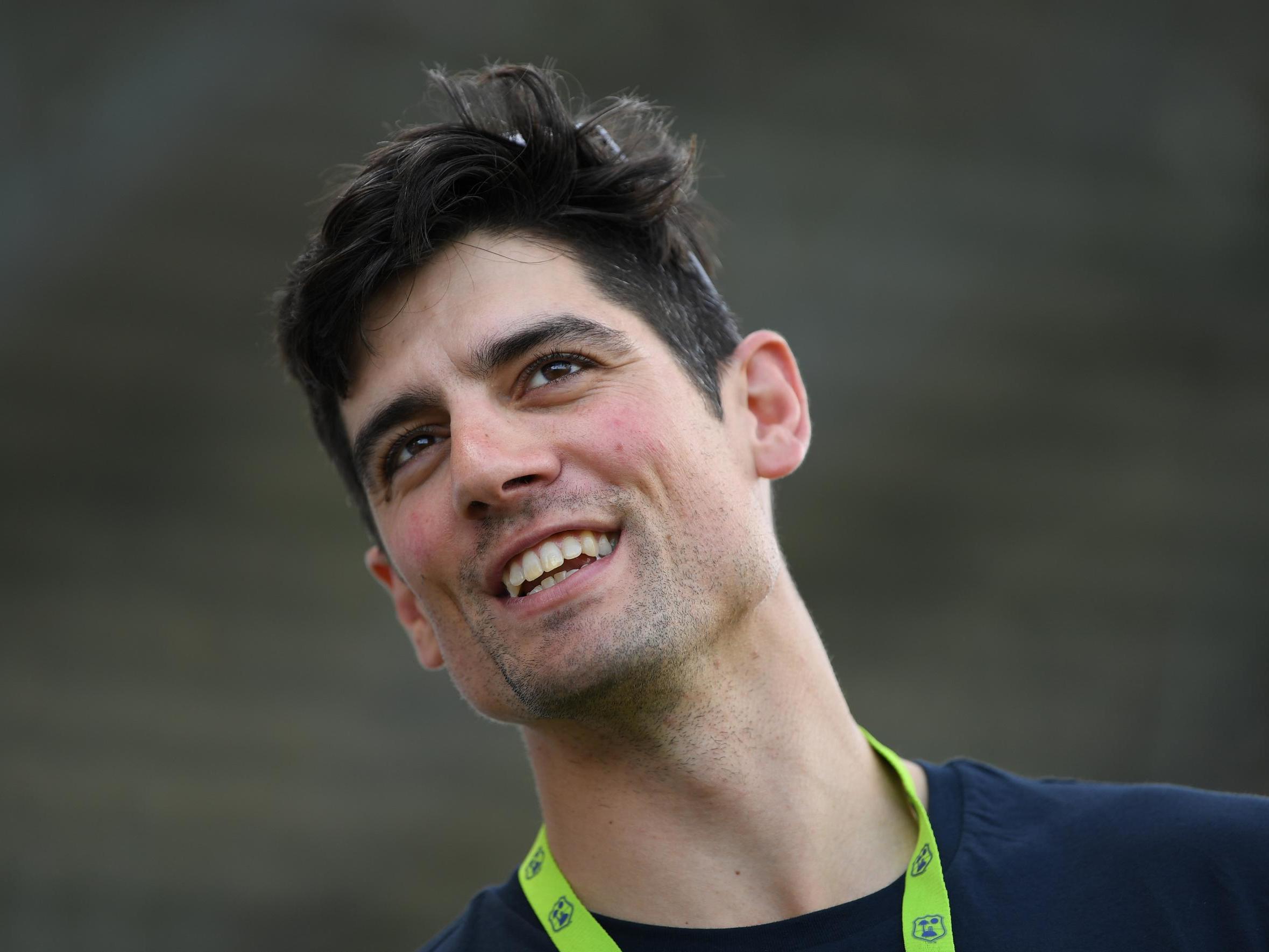Alastair Cook admits regrets over England career but marvels as hosts have since ‘taken the limits’ out of one-day game
Interview: Cook has reflected on his time as captain and the near miss in the Champions Trophy vs India with 100 days until the World Cup

Your support helps us to tell the story
From reproductive rights to climate change to Big Tech, The Independent is on the ground when the story is developing. Whether it's investigating the financials of Elon Musk's pro-Trump PAC or producing our latest documentary, 'The A Word', which shines a light on the American women fighting for reproductive rights, we know how important it is to parse out the facts from the messaging.
At such a critical moment in US history, we need reporters on the ground. Your donation allows us to keep sending journalists to speak to both sides of the story.
The Independent is trusted by Americans across the entire political spectrum. And unlike many other quality news outlets, we choose not to lock Americans out of our reporting and analysis with paywalls. We believe quality journalism should be available to everyone, paid for by those who can afford it.
Your support makes all the difference.The ball is on leg stump, and from the instant it leaves the bowler’s hand Alastair Cook has the measure of it. The eyes widen just a little, the feet shuffle instinctively into position, his weight shifts forward and the bat comes down in a gentle arc, turning the delivery firmly towards square leg. After all, when you’ve got more than 15,000 international runs to your name, putting away the bad ball becomes less a choice and more a compulsion. Never mind that the ball is made of rubber, the bowler delivering it is around eight years old, and the man close in on the leg-side is Chris from Love Island.
We’re on unfamiliar turf, in more senses than one. For one morning only, London’s Trafalgar Square has been transformed into a little urban cricket hive, to mark 100 days until the start of the 2019 men’s Cricket World Cup. Stops have been pulled out. Celebrities have been roped in: Harry Judd from McFly, Olympic swimmer Rebecca Adlington, the aforementioned Chris, who has 1.9 million Instagram followers and been romantically linked with Jesy from Little Mix, it says here. And mingling amongst them, smiling diffidently for the cameras, is Cook: England’s recently-retired 161-Test veteran.
Sir Alastair Cook, that is. He’s off to the Palace next week for his investiture, but he won’t have long to savour it. Pre-season with Essex begins in a few weeks, and come the start of the County Championship season in April plenty of Division One seamers will fancy their chances of knocking over our newest knight of the realm.
Yet if a week is a long time in politics, 100 days can be an age in cricket. At this stage in the last World Cup cycle, Cook was still England’s one-day international captain, putting his finishing touches to his strategy for the 2015 tournament in Australia and New Zealand. Eight weeks before their first game, after a particularly poor series in Sri Lanka, he was abruptly sacked. Cook never played another international white-ball game, and one of England’s greatest modern batsmen ended his career without ever featuring in the biggest tournament of them all.
There are clearly still feelings there, too. “Whether we’d have won it or not – and I don’t think we would – I don’t think it was the right decision to make,” he says. “When I was made captain, one of my things was that whatever happens in those four years, you don’t want to make major changes just before a World Cup. We’d done it before, and it never worked.”
England, you may remember, did not win that World Cup, exiting at the group stage after an ignominious defeat to Bangladesh under a shell-shocked Eoin Morgan. And even through his disappointment, Cook recognises that England’s white-ball cricket needed a shake-up, and that Morgan was the man to deliver it. “Maybe it was the best thing for that team, with Eoin as captain,” he reflects. “Realising they had to change their ways. Fair play to him: the way he’s taken that team forward has been great to watch.”
As we approach the final stretch to 2019, England are now the world’s No 1 side, and strong favourites to lift their first global 50-over trophy. They’ve won their last nine bilateral series. They’ve broken the world record ODI score (444), and then broken it again (481). “It’s a side we can be very proud of,” Cook says. “Guys who have taken the limits out of one-day cricket. It’s almost a we-can-get-500 attitude. That’s an extraordinary attitude to have.”
Yet it’s often forgotten that the last England side before Morgan’s to reach No1 in the world rankings was Cook’s side in 2012. The last team to reach a global 50-over final was Cook’s team that came agonisingly close to winning the Champions Trophy in 2013, needing 20 off 16 balls to beat India, and losing by five runs. And even if the one-day game was radically remade in the subsequent years, leaving England and its coterie of steady accumulators behind, there’s still a residual pride in Cook at what he managed to achieve in a game to which he was not naturally suited.

“The big missed opportunity was that Champions Trophy final,” he remembers. “Because actually, we were playing brilliant one-day cricket. The way the game was played, with four men inside the circle from 15 overs, and people who could knock it around really well, we became the best side in the world doing it. That’s the one I felt disappointed about. We could have won that trophy. We were quite clearly the favourites going into that game and backed ourselves.”
And yet, when you’ve achieved what Cook has in the game, regret is a scarce commodity. “I’m not envious,” he says. “I always found one-day cricket a lot harder. I had to change my game. I had my go for those four years, and now I’ve got a great pride in watching these players who are setting the trend in one-day cricket.”
These days, Cook’s observations are largely confined to the media pulpit. His first taste of media work came on England’s recent tour of the Caribbean, where his former team-mates were vaguely unnerved by the sight of their erstwhile leader walking among them in a sensible shirt and trousers commentating for the BBC. “I’ve really enjoyed it,” he says of his first taste of the other side. “It’s really interesting seeing the game from a different side, taking the emotion out of it. When you’re playing, every ball seems like the biggest event. When you’re sitting back, you can see the overall picture better.”

Cook is aware of the unique challenges professional athletes face when they step away from the cauldron: the loss of routine, the loss of rhythm, the loss of the rush. “That’s the biggest problem when people retire: most of the time, they’re searching for that,” he says. “And it’s about accepting that you had your time. You lived on incredible highs, you lived – mainly – on incredible lows, because cricket’s a game of failure.
“You’ve got to accept that it is going to be different. And that you get rewards from different things. So the five months I had at home: you’re not getting the massive highs and lows, but you’re getting to see your children grow up, and spend quality time with them that you wouldn’t have. And that gives you a different kind of satisfaction.”
Besides, it’s not a completely clean break. He’ll be combining the media work with the new three-year contract he signed with Essex last autumn: the ultimate cricketing obsessive, finally discovering some balance. And if his new title attracts the derision of opposition bowlers and fielders? “Well, I’ll send them to the Tower,” he replies, and with a hollow chuckle and a wicked glint in the eye, he’s gone.
Join our commenting forum
Join thought-provoking conversations, follow other Independent readers and see their replies
Comments